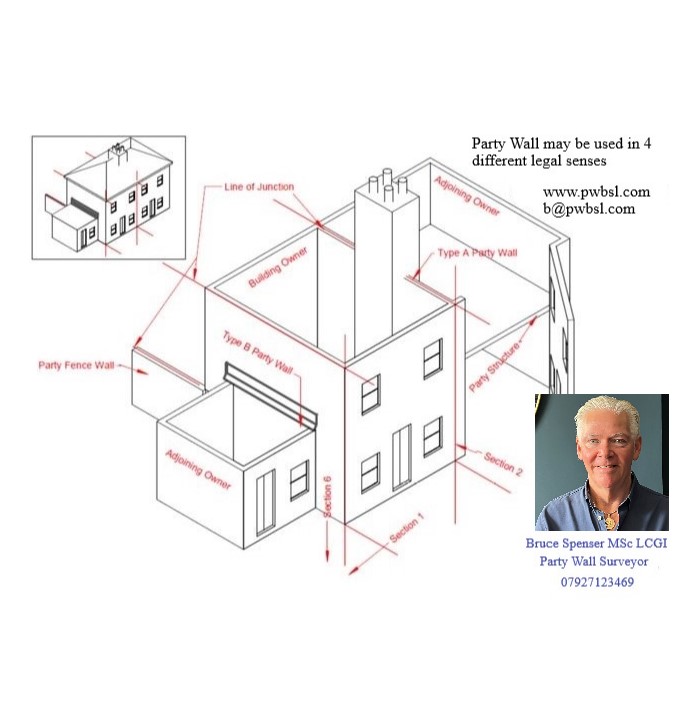Party Wall Case Law
Case Law – The Party Wall Act came into being in 1996; however it stands on the shoulders of over a hundred years of Party Wall case law and statute. Case law is the interpretation of statute by reference to precedent. The case law maker, the modern judge is required not to immerse himself in pedantry but to look to the common sense meaning of the work, sentence, paragraph etc (the plain meaning rule). If this is not clear the judge will next look at the meaning of the legislature. It is very clear that the legislature and the courts intend that simple common sense should apply to the act and it be administered by reasonable people. Some common case law is listed below:
“46. For these reasons, I reject the claimant’s submission under issue (1) that a section 10 award is restricted to dealing with those matters about which the building owner and the adjoining owner disagree.” THE QUEEN ON THE APPLICATION OF FARRS LANE DEVELOPMENTS LIMITED Claimant v BRISTOL MAGISTRATES’ COURT Defendant JAMES MCALLISTER
Use the Party Wall Act – do not attempt to slyly circumnavigate it – Udal v Dutton 2007 –
it is there to provide a mechanism by which agreements can be reached and disputes settled ideally without expensive, time consuming and stressful court action (minimum of £15k) -“there are too many calamitous neighbor disputes in the Courts. Greater use should be made of the services of local mediators, who have specialist legal and surveying skills and are experienced in alternative dispute resolution. An attempt at mediation should be made right at the beginning of a dispute and certainly well before things turn nasty and become expensive. By time neighbors get to Court it is often far too late for the Court based ADR and mediation schemes to have much impact. Litigation hardens attitudes. Costs become an additional aggravating issue. Almost by its own momentum the case that cried out for compromise moves onward and upwards to a conclusion that is disastrous for one of the parties or possibly both.The extreme acrimony between these neighbors is nothing new” – Lord Justice Murray – Bradford and Bradford v James and others – 2008
if an owner is in breach of a party wall award the other owner is prima facie entitled to protect their interests by seeking and injunction – Chliaifchtein v Wainbridge
It is common ground that an action for breach of statutory duty is not actionable per se, but only upon the occurrence of damage Bridgland v Earlsmead
Parties may contractually opt out of the 1996 act Dillard v Commercial Property Holding
Correct Method of appeal against Party Wall Awards and decisions of Party Wall Surveyors – Zissis v Lukomski & Carter (2006) – Part 52 is the correct method of appeal
Noise, dust, dirt etc. whilst carrying out works subject to the Party Wall Act – The reasonableness of such – Andrea v Selfridge (1938) – Be reasonable – the author thinks of the doctrine of the reasonable man
Serving of Notices, by whom and who they should be served upon, what should be in the notice, when they notices should be served, time limits, separation of the good from the bad of a party wall Award, Validity of awards – this is spelt out within the act and there is much case law
Methods of Serving
The most recent case law Night v Goulandris on the methods of serving notices, award etc allows any method as long as the server can guarantee the document has been served
Common law liability stands- Louis v Sadiqi 1997 – If the act is not complied with
Easements Arena v Europa
Dates for serving Godwin v Swindon BC
Boundary line is the centre line of a party fence wall
Duty to weather a party wall- Marchant V Capital (1983) – after demolition and also imposition of continual obligations.
Duty to prevent foreseable damage Rees v Skerrett 2001 – also contained within the 1996 Party Wall Act.
Duty to prevent foreseable damage (mitigate one’s loss) – Saunders v Williams 2002
Obligation imposed by party wall awards- Mason v Fulham (1910) do not carry on after the sale of a property
The Jurisdiction of the party Wall Surveyors are covered in much case law – notably Stone V Hastie (1903)
Legal Costs Incurred-Reeves v Blake covers the legal costs incurred and the Party Wall Surveyor’s ability or non-ability to award or adjudicate on them – very interesting this one
Compensation- Crowley v Rushmoore –
Usurping of common law rights by the Party Wall Statute – Louis V Sadiq – LJ Evans
Access is allowed under Section 8 – dont fight it – Davies and Sleep v Wise and Wise – 2006
Section 10 (6) and (7) re refusal or neglect to act effectively with the consequence that the surveyor was empowered to act ex-parte in issuing awards and fees – Patel v Peters
Compensation- Crowley v Rushmoore –
Damages may include nuisance, trespass, harassment, personal injury and financial loss Jones & Lovegrove v Ruth(s)
Usurping of common law rights by the Party Wall Statute – Louis V Sadiq – LJ Evans
Access is allowed under Section 8 – dont fight it – Davies and Sleep v Wise and Wise – 2006
The courts expect people to comply with the act, however if a party fence wall is demolished and rebuilt without serving notices the court will not be punitive where damages are concerned but modest – Rashid v Sharif
The courts expect people to comply with the act, however £20k damages claimed can be reduced to £500 as the court will not act punitively but reasonably as they also so expect owners to be Seef v Ho
Estoppel – this is the principle which precludes a person from asserting something contrary to what is implied by a previous action or statement – Frances Holland School v Wassef 2001 – if Surveyors/owners proceed wrongly but proceed none the less they commit themselves to a course which can not be stopped by stating they should not have gone along the wrongful journey they have.
However if the preliminary procedures of the act are not followed (serving of notices, appointment of surveyors etc) and owners to not acquiesce to the procedure there is no jurisdiction to proceed – Rodrigues v Sokal 2008.
Estoppel is very important when determining the jurisdiction of surveyors; Surveyors who are inadequate will often not realise the importance of following the letter of the law when establishing jurisdiction and consider themselves appointed and proceed with settling a dispute ex parte or with a fellow inadequate third surveyor (often appointed inadequately by a local council officer (see below)); their inadequacy leads to an ignorant attempt to usurp the legislation. What the other surveyor and their appointed owner(s) must realise is that if they can be seen to consent and join the inadequate surveyor along his journey the doctrine of estoppel can give legitimacy to the inadequate surveyor and remove rights and jurisdiction.
Easements (support, right to use, weather protection, light, drainage, repair ((servient and dominant)), that old gas flue) and rights of light shall not be interfered with by an award
Party Wall Surveyors are in a statutory role which is quasi judicial – Gyle-Thompson v Wall St (1974)
Boundaries and party fence walls Burns v Morton
Once the process has started the surveyors must be reasonably paid but they don’t deserve a feast when a reasonable snack will suffice – Dust v Greenaway and MacNulty and of course Judge Bailey – however the fees of the adjoining owner’s surveyor (and disbursements) are the responsibility of the Adjoining Owner, “it may well be that as a matter of convenience the Building Owner pays the Adjoining Owner’s Surveyors fees directly but that is not the legal position. The Claimant therefore must look to the Adjoining Owners who appointed him for payment of his fees and for the reasons stated he is not entitled to claim them from the Defendant.” Van Maanen v West Greenwich Devolpments 2009 (the debt must be assigned)
Fees of the surveyors – Has subsequently been overturned in THE QUEEN ON THE APPLICATION OF FARRS LANE DEVELOPMENTS LIMITED Claimant v BRISTOL MAGISTRATES’ COURT Defendant JAMES MCALLISTER – “An award under section 10 of the 1996 Act requiring a party to pay a statutorily appointed surveyor’s fees may direct that that payment be made to the surveyor directly”
The act does not cover the fees of lawyers – Blake v Reeves – but a Party Wall Surveyor may claim their fees for preparing their case and appearing in court (not as a litigant in person rate) THE QUEEN ON THE APPLICATION OF FARRS LANE DEVELOPMENTS LIMITED Claimant v BRISTOL MAGISTRATES’ COURT Defendant JAMES MCALLISTER
Kay v Lawrence – security for expenses – expenses are not compensatory damages whereby the Building Owner must put an adjoining owner in a position they would have been before the damage occurred but a choice to take financial compensation – If the expense is a certainty it can be managed by insurances, and surety bonds or of course by a payment into an escrow account. However if it is not certain it may not exist.
Road Runner
You have the chance to comply and utilise the Party Wall Act – if you choose not to you can not expect the law to retrospectively support you Roadrunner v Dean
The Part B Party Wall
- Frederick Betts Ltd v Pickfords Ltd [1906] – Chancery Division. London Building Act 1894 – The expression Party wall means; a. a wall forming part of a building and used or constructed to be used for separation of adjoining buildings belonging to different owners or occupied or constructed or adapted to be occupied by different persons – this is the current type b party wall; The adjoining owner had enclosed on the building owner’s wall; Kekewich J; “what right had the defendants to use that wall as a party wall? It is the external wall built by the plaintiffs on their own ground. If the defendants desire to use the adjoining premises for stables or for any other purpose they can erect their own containing wall; they have no business to use the wall of the plaintiffs, and it seems to me that they doing that,, and that there again they are using as a party wall what they have no business to use as a party wall.” The courts granted an injunction restraining the adjoining owner from committing any trespass on the wall or from using the walls as party walls. The adjoining owners were ordered to remove the stanchions and roof timbers.
Party Wall Surveyor serving Thanet and London
Third Surveyor serving England and Wales


